Mythwrecked: Ambrosia Island
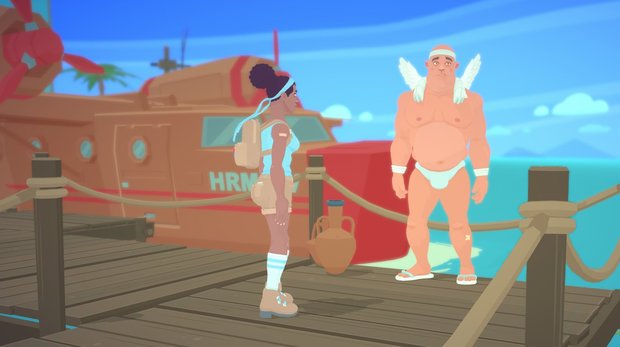
- 1 Comment
Cozy, addictive collectathon becomes a fetching mystery adventure from the creators of Röki
I’ve always been interested in history, especially ancient Greece. The myths and legends in that cradle of Western civilization speak to my imagination, and clearly they spoke to developer Polygon Treehouse as well. In Mythwrecked: Ambrosia Island, their cozy follow-up to the acclaimed Röki, they drop players on an island populated by the Greek pantheon in modern human form, and have you carry out tasks for the gods so they will help you return home. It may be relatively superficial and repetitive in nature, but there are enough fetch quests, conversations with other characters and even a mystery to uncover to make discovering the island’s secrets extremely addictive and very rewarding.
Alex (short for Alexandra) is a young woman in need of vacation, but when she charters a private ferry to a Greek island, her ship is caught in a sudden storm. Next thing she knows, night has fallen and she wakes up on the shore of a mysterious island. As she goes searching for the captain of her ship, she is suddenly addressed by a talking statue, the Oracle. From her, Alex receives a device called the Ambrosidex, a sort of handheld computer on which you can consult your objectives and keep track of all kinds of collectibles. The Oracle also advises Alex to seek out the other island dwellers amongst all the seagulls and hermit crabs. She points you to the first of them, called the Messenger, who resides in a seaplane at the docks.
Upon arriving there, it turns out the Messenger is only prepared to talk to you during daylight hours. This becomes a common theme, as all characters have their own specific time frames during which they can be contacted. Mythwrecked features a day-night cycle, and time passes continuously as you’re on the move. It requires no particular actions to advance it, though progression is stalled during conversations. The clock in the top left corner of the screen will indicate the current time, but the changing color environmental palette will clue you in without it as the sun rises and sets: from soft pink at dawn to brighter daylight colors, then a reddish hue at dusk into dark blue nighttime.
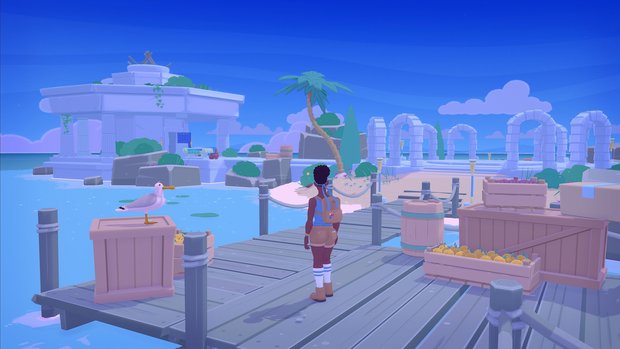
If you are waiting for a specific person to become available, you can rest on one of several benches found all over the island to pass the time. (Sitting down also allows you to save manually; Mythwrecked offers five save slots but lacks an autosave, though it will remind you to record your progress before quitting.) Next to these benches, there are blankets and cushions on the ground where you can listen to music while taking in the sights. Relaxing in these spots doesn’t progress time, though; it’s merely a reward for finding one of the many collectibles this game has to offer. The entire score heard throughout the game has been split up into individual tracks that can be found on cassette tapes strewn around, which you then can play manually at resting spots. All the music is instrumental, composed and performed by Aether. The tracks are generally ambient with a calm and enchanting quality, but they become intense and dramatic to suit certain events.
With nothing else to do at first, Alex needs to find shelter and wait for morning. You can later decorate and furnish your refuge – an abandoned lighthouse – with all kinds of collectibles. When you get the chance to explore more of the island, additional gameplay elements will reveal themselves. You will pass many bushes bearing golden ambrosia fruit, which can be collected and exchanged for other items, but only if you meet certain requirements. The Messenger, for instance – who turns out to be the Greek god Hermes – will only trade once he has gotten to know you better. So you need to talk to him and help him feed the gulls, which raises your “friendship” stat with him. Ultimately, you will need to befriend all the deities you encounter in similar ways. An upside to this: once you have reached the primary friend level, they will allow you access into their private dwellings, and you no longer have to wait outside until they come out on their own.
Mythwrecked is best played with a gamepad, though it also supports keyboard/mouse combos (you can rebind the controls to your personal preference). The look and feel of the island, with its cartoony art style and soft pastel color schemes, are reminiscent of the tower in Chants of Sennaar, albeit with plenty of Greek influences: lots of columns, amphoras, and statues. You can freely explore this three-dimensional environment, examine points of interest (which activate a pop-up icon indicating a possible action when you are close enough), and talk to others you meet. The dialogue is subtitled but not completely voiced. The characters will only utter the occasional word like “Thanks!” or “Wow!” and sigh, grunt or laugh depending on their emotional reactions. It’s charming at first, but after a while these sounds become a bit annoying in their repetitiveness, to the point that I would have preferred the characters remain completely silent and rely on body language instead.
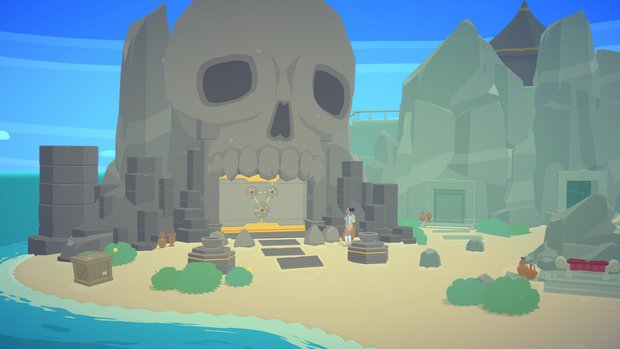
The character designs are definitely a strong suit, depicting the Greek gods very differently than we’re used to: Zeus and Hera are presented as a showbiz power couple, in strapping white outfits with lots of bling, as if they’re ready to jump on stage and give a concert; Ares is a gruff, Mohawk-sporting punker in camouflage pants and dog tags around his neck, and when he talks he always seems to growl like a lion; Poseidon is your typical Californian surfer dude; Athena is a geek with her nose constantly in her books; Hades is a pale emo teenager who only comes out at night; Aphrodite wears a short, alluring summer dress; and Hephaestus – known to be a great craftsman but with underdeveloped legs – is bound to a wheelchair. The artists really put thought into how to present these ancient figures in a more modern way. Only Hermes felt a bit out of whack, wearing only tighty-whities, pool slippers, and a pair of wings clipped to his shoulders.
Complicating matters is that each of these gods suffers from amnesia. They have completely forgotten who they are and how they came to this island. There’s a general atmosphere of fear and distrust revolving around this mystery, and they keep accusing each other as the ones responsible for their predicament. Of course these insecurities cause them to be very defensive and distant towards you as well. Your first job, then, is to win their trust by helping each one out with something: Hades wants you to recover the lost spirits of the dead; lazy Poseidon will ask your help to fill up all the dry fountains again; Aphrodite hands you a special vacuum-type version of Pandora’s Box to clean up her mosaic tile floors.
As you start the game, only half of the beach is accessible, with walls blocking your way into the harbor and the other side of the island. While exploring, you will open up shortcuts between these different areas, making travel easy and fast. You will also see smaller islands offshore, which you can only reach after receiving an item from Poseidon to move across water. After befriending Hermes, you will gain access to the inner parts of the island as well. At first this feels slightly maze-like, though rest assured it’s no true maze. Soon enough you will find your way from Aphrodite’s secret garden to Ares’s ambrosia fruit farm, from Hephaestus’s workshop to Zeus and Hera’s open-air atrium, and from Poseidon’s ship to Hades’s underground cave. Athena’s library tower is guarded by laser-shooting owl statues, however, and you will only be able to pass after helping out the other gods first.
The island doesn’t feel too big, but it’s large enough to keep you running around for quite some time. Thankfully you’ll continually pass bushes filled with fruit, so on every screen there is always something to do if you wish. Still, this is where the in-game map comes in handy, as all currently available quests are automatically highlighted. You won’t have to wander around aimlessly in hopes of stumbling onto them, making it easier to plan a route around the island.
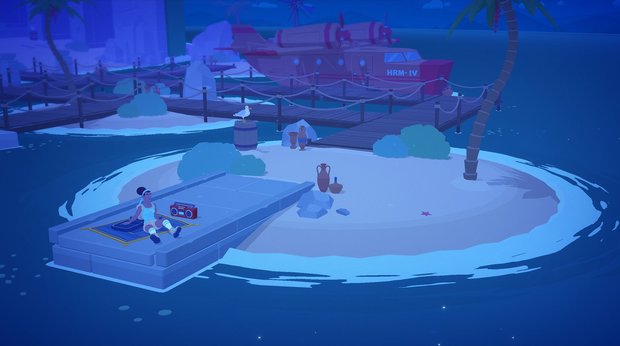
After an initial level of trust is earned, the gods will agree to let you help them recover their memories by searching for lost mementos. Your Ambrosidex will then allow you to scan the island for buried or hidden packages containing character-specific items, which you then need to return to the right god. A radar icon is unlocked below the clock, and when you enter a region where a memento is hidden, the radar’s bars will flash brighter as you get closer, together with a higher-pitched beeping sound, like a game of “Hot & Cold.” If you are familiar with the Greek pantheon and their stories, it’s usually quite obvious which item belongs to which god – the accessories Hermes lost will always feature little wings, Hephaestus is looking for tools or unfinished inventions – but you can always ask the Oracle statue for an extra hint if necessary.
Each god has three friend levels, meaning you will have to go through this entire procedure three times, each a bit trickier than the last. The task may seem entirely nonlinear right away, giving you the choice of which quest to pursue first, but some locations can only be reached after you have become friends with a particular god. Said god will then give you their seal to open locked gateways, behind which other gods reside. You have to align these seals correctly with the gate’s ornamentations, but more complex puzzling would have been welcome here. Without that, opening the gateways feels a bit too much like simply going through the motions, without any real effort involved.
Each friend level you attain will trigger new memories in the gods. They will start to recall who they were, how they got to the island, even how and why they became gods and what went wrong afterwards, all leading up to the cause of their amnesia. This will unlock new dialogue options, and you can ask them for more details each time they trust you a bit more, leading to further insights into what actually happened to them.
As mentioned, each god who trusts you will swap things for ambrosia fruit. Most of them are purely collectibles: Aphrodite will put up statues of all the gods in the main atrium; Hephaestus will make new furniture for your lighthouse shelter; Zeus and Hera will provide you with even more music cassettes. Only Hermes really has something truly worthwhile – keys to portals, which connect the different parts of the island to a centrally located nexus for even easier and faster travel. Progress starts off fairly linear, but as you befriend more and more gods, you will be on the lookout for multiple quest items at the same time. I finished the game in just under ten hours, but I can imagine it taking longer if you concentrate on helping out one god at a time.
Once you have completely befriended all the gods, you will have discovered enough clues as to how they were robbed of their memories and identity, and it’s time to confront a mysterious enemy. Mythwrecked will offer a warning at that point that you’re about to start the finale, so if you still have any loose ends to tie up (any collections you still want to complete), you better take care of them first. What it didn’t warn me about was that I wouldn’t be able to save my game beyond that point! The music picks up with some nervous violins, adding a sense of urgency and danger, giving the impression it’s a timed event, but it really isn’t. In fact, it took me 30 minutes to go talk to all the gods one last time. I understand disabling the save option here, but if I had known it would take me a half-hour to reach the end, I would have saved it for another day.
Final Verdict
This is not a game you want to rush through, as from the get-go I enjoyed running around Ambrosia Island. Never lacking for something to do, I found myself often overwhelmed with possibilities, but in a positive, elated sort of way. Usually I’m not into achievements or collectibles, but in Mythwrecked they are central to the gameplay and highly rewarding, so addictive is that feeling of finding hidden items. The fetch quests themselves are satisfying to complete because they offer more lore about the world of these unusual gods without sifting through pages and pages of reading material. These Greek deities kept me entertained every step of the way, and this loveable bunch will no doubt steal your heart. I only wish the succinct revelations about them were linked to some actual puzzles, making the whole adventure more interactive than simply collecting things and returning them. Still, if you enjoy scavenging for lost items, doing so on a beautiful island filled with quirky Greek gods will keep you happily entertained for hours, feeling like your prayers have been answered.
Hot take
The charming Mythwrecked: Ambrosia Island is a low-challenge but extremely addictive fetch quest and collectible-gathering Elysium filled with fun cartoony Greek gods to make friends with along the way.
Pros
- Fun setting to explore for fetch quests and collectibles
- Extremely addictive gameplay
- Quirky collection of divine characters
- Story filled with fun mythological lore
Cons
- Partial vocal utterances can become annoying
- Collectibles aren’t connected to more complex puzzles
- Can’t save during the 30-minute endgame
Johnny played his own copy of Mythwrecked: Ambrosia Island on PC.


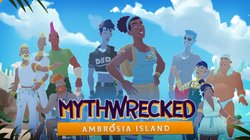

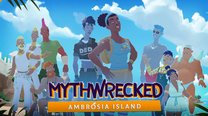






1 Comment
Want to join the discussion? Leave a comment as guest, sign in or register in our forums.
Well, I played the whole game as well. And okay, it kept my attention to the end, so that's a good thing. I confess I liked it less than you, mostly because I have an interest in Greek myth, and found Mythwrecked's depiction of the gods didn't match my expectations. But hey, not saying it's a bad game.
Reply
Leave a comment